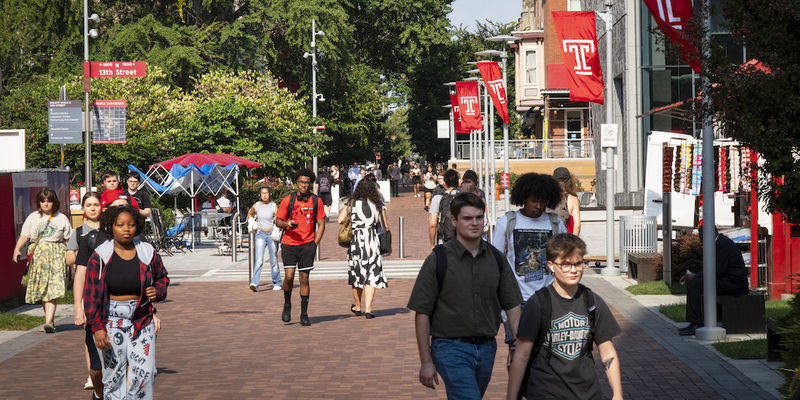New social justice minor gives students tools for change
The new interdisciplinary minor is offered through the Honors Program and is open to all students.

What is a just society? How do we define social justice? What are the social, political, economic and cultural forces or factors that create injustice? How can injustice be eradicated? Why is social justice an issue for everyone?
These are questions being explored by students pursuing Temple’s new social justice minor being offered for the first time this fall 2024 semester.
Through interdisciplinary study in classes at schools and colleges across the university, students will define what social justice is, gain tools for understanding public policy and its outcomes, earn a clearer understanding of how social justice is perpetuated, and explore theories of justice. The topic will be approached through the lens of six key areas of inquiry: economic inequality and justice; race and justice; environmental and food justice; social protest/dissent; crime, law and punishment; and public health and ill-health.
“Social justice and civic engagement service are things that Temple is known for, and now we have an academic program that's going to highlight and bring together those areas into one place with one particular goal,” said Director of Temple Honors Amanda Neuber. “I think it’s going to celebrate what makes Temple really special and mission-driven.”
Although the minor is being offered through the Honors Program, it is open to all undergraduate students of all majors. While the Honors Program has traditionally offered academic opportunities, advising and community to only Honors students, the new social justice minor is a way to cement its status as a hub for interdisciplinary study for students across the university.
“The Honors Program’s interdisciplinary minor in social justice is one of the first truly interdisciplinary programs available to all undergraduate students at Temple. It is a significant step toward Temple’s goal of offering more cross-college and multidisciplinary program choices for our students,” said Vice Provost for Undergraduate Studies Daniel Berman. “But even more importantly, it offers students a new opportunity to craft an academic pathway that fits their interests, choosing from classes that span multiple fields and scholarly disciplines, focused on the theme of social justice.”
Neuber envisions the Honors Program as the place at the university where interdisciplinary education can happen for undergraduates, not just for students that are accepted into the Honors Program but for all students at Temple who choose to take on the challenge of interdisciplinary learning.
“Interdisciplinary study can be really challenging because it forces you to step outside of your comfort zone. It forces you to think about things from fields and perspectives that you're not necessarily comfortable or well-versed in yet,” said Neuber. “We really want to challenge our students to think about things and to stay curious and to continue to ask a significant number of questions.”
The social justice minor includes classes from nearly every undergraduate school and college at Temple. The range of class topics is wide: for example, students can take classes on gentrification and activism at Tyler School of Art and Architecture, Marxism and critical theory at the College of Liberal Arts, corporate sustainability and ethical reasoning in business at the Fox School of Business, and AIDS and cultural competency at the College of Public Health, just to name a few.
“I feel that this minor will allow me to explore how systemic inequalities impact psychological well-being and how we can create more equitable support systems,” said Sylvia Vanessa Tejada, Class of 2027, a Walpole, Massachusetts, native majoring in psychology. “I am passionate about understanding how social structures influence individual and collective behavior. For example, I often consider how reforming our criminal justice system could lead to better mental health outcomes for individuals and communities.”
As an art history major from Chicago, Kendall Wallace, Class of 2028, is pursuing the social justice minor because of an interest in supporting artists of color and decreasing the diversity gap in the art world. “I hope to gain a deeper understanding of social justice theories and tools that will allow me to contribute meaningfully to the causes I care about,” Wallace said.
According to Bryant Simon, the inaugural academic chair of the Honors Program, the minor provides an opportunity to take advantage of the “bigness” of Temple and its ample opportunities and resources. Honors administrators also hope to bolster the minor with programming including guest speakers, common reading programs and its own podcast.
“In the Honors Program, we do a really good job of making the university seem smaller and making students feel welcome and seen and cared about,” said Simon. “We’ve built this minor as a pathway through this big university, enabling students to take advantage of all the things offered.”
Neuber and Simon hope the minor benefits students by providing them with tools to solve problems in a wide variety of career paths.
“I’m hoping that the social justice minor can become an incubator for better public policy, with students applying what they learn in their classes to the problems and challenges around them,” said Simon.
“Seeing things from a variety of perspectives will make students better critical thinkers, better decision-makers and better problem-solvers in the future,” added Neuber. “It’s not only getting a well-rounded understanding of what social justice is, but also how to attack the issues that it brings up from many different perspectives as well.”


